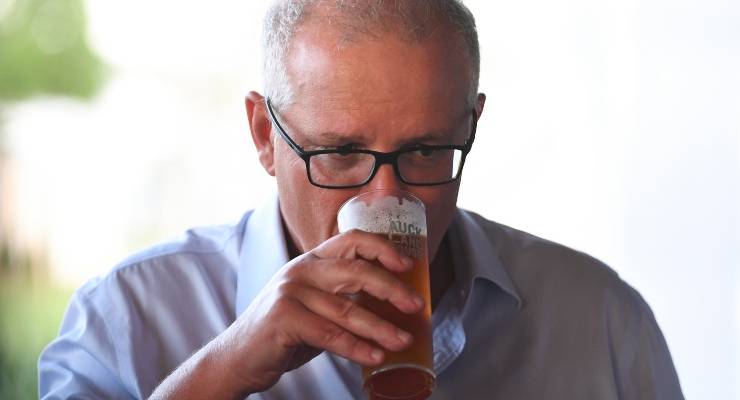
Beer and politics have long gone hand in hand.
The “pub test” is the barometer of what is acceptable in politics. Photographs of politicians — almost always male — standing at the bar of a country pub are obligatory campaign-trail fodder. Such shots are planned, with a forensic level of detail, to show off the candidate as a man of the people, a bloke happy to sit down and chat with anyone… and a mouthful of hops can make any yarn go down.
Graphic depictions of a pint will flood post-Budget coverage, denoting how much the government takes in taxes and how that influences the price at the tap.
The politics of beer runs deeper than that, though. Private companies can offer reports into which breweries donate to which political parties. Research pegs different beers to different cohorts of voters. And roundtables are even held to ensure the right beer is served at the right function.
Beer is important to any government’s re-election chances. And that’s why this government floated a plan to cut the cost of beer.
But the message it delivered, and the optics around it, show the Morrison government hasn’t learnt a thing about how women believe they are being treated. Or they are just unable to comprehend it.
Indeed, it’s almost as though the architect might have been drunk knocking this scheme together.
Scott Morrison has a few weak spots, but his treatment of women is one of the biggest and most vulnerable. That’s why Jenny Morrison was brought out of relative anonymity to appear on Sunday night TV. That’s why we had the prime minister voice an apology to women who’d been harassed and assaulted while working at Parliament House. That’s why Grace Tame gave the prime minister the evil eye.
Women and Scott Morrison are not looking like a good mix ahead of this election. But neither is beer and women if you look at the official figures, which show half of all Australian men nominate beer as their preferred tipple, compared to just 10% of women.
Context is everything (and I’ll come to Karl Stefanovic sipping a margarita shortly).
But why would anyone — let alone someone whose previous job and expertise revolve around marketing — think it was a good idea to announce that 50% of blokes will get to dip into the electoral treasure chest, while for most women the lock would go back on?
What did they think the optics of that might be? And did they stop to think how it might be read, in the same week as the government admits how it has failed women?
Beer prices should be cut; the amount of tax it nets the government — almost $3.6 billion last year — is appalling. But why not reduce the taxes inflating wine prices? Or petrol prices?
Or even the ingredients in Karl Stefanovic’s margarita, which many women (at least the ones I know) might support. The tax there has jumped by 91 cents since Scott Morrison was elected to Parliament.
It’s not the drop in price that is the telling factor here. It’s the message around it — that it was targeted at men, and the fact that no one saw that it could possibly continue to entrench the view many women share of this government.
On Sunday night’s episode of 60 Minutes on Nine, Jenny Morrison came across as warm and hospitable, smart and sassy. And honest. Yes, she’s been panned for this or that, but ask women who don’t bat for one side or the other in politics, and she came across as one of them: an articulate woman and mother trying to navigate a tricky world.
She said she didn’t formulate politics and wasn’t much interested in it — like many others in the nation — but she was happy to offer an opinion if her husband asked.
But we can be certain this policy idea wasn’t one of those floated at home because, irrespective of what is on tap, it simply doesn’t pass the pub test.








Maybe, he’s given up on the women’s vote and is just intent on keeping the blokes’ vote?
Has been for quite a while. You can pick it in pretty much everything he does and says. He’s talking to blokes- not women- he knows only 35% of women vote for his mob.
You might remember nearly a year ago Katharine Murphy in The Guardian pointed out:
This prime minister speaks almost exclusively to one cohort of voters: men at risk of voting Labor.
And he still does. He has learned nothing over the last year and voters – especially women but also many men are increasingly aware of this. His party’s failings on this issue and on the handling of the pandemic, timely ordering of of vaccine and booster supplies, coupled with the RATs fiasco, among other matters (performances on the international stage), leave Australia’s standing on a downward trajectory. While the reported $16 million as a war chest leading into the election……. It’s late at night, I have to stop here!
I’d like to hope that was true but I remember in the 50/60s that the reign of Silver Ming was sustained by the women’s vote.
In 2016, 52% of white women with a college education (NFI…) voted for Trump though that is probably is more indicative of what passes for a college education in the US than womanhood in general.
At least, I’d like to hope so.
I suspect the women’s vote for Trump was more desperation AGAINST the status quo than FOR Trump. I have some otherwise perfectly sensible women friends in the US who were willing to vote for anyone that promised differently than the …. gosh I’d better stop here or they’ll censor me again!
Jen would have resonated with women struggling with a useless, ignorant husband 🙂
Jen did not resonate with women generally.
The women who are married to the useless ignorant husband don’t usually defend them.
She too is seen as lazy and indulged, without the wit to understand that attacking Grace Tame was a very poor move.
I could just hear her sounding disapproving of a young abuse victim, who also happens to be a very insightful, articulate young woman, with no time for a 50’s parody of a Prime Minimal.
Can anyone else just hear Jen with the ladies at church, gossiping viciously, lips pursed, about someone who supposedly “insulted her husband”?.
As for “her” decision to take her girls on holiday out of the toxic smoke blanketing Sydney, that hundreds of people were dying from, well done and the “apology” was an oxymoron.
Who said that “Jen” couldn’t take her girls to Hawaii?
Did it automatically follow that Scotty from marketing had to go too?
Sneak out of the country while Sydney was ringed by fire?
Failed to delegate his national emergency authority, failed to organize extra water bombing planes and the list goes on.
So clever! scotty from marketing can run a natural disaster on multiple fronts by phone from Hawaii?
I actually thought that this whole appalling theatre didn’t do Jenny any favours.
This is a woman who was willing to be used in this manner by a man. I don’t care that he is her husband. Rather than warm and relatable she came across as affectatious and pretentious. And she was trying to defend the indefensible, namely her husband’s behaviour during his time as PM. She seriously was trying to tell us that he’s a nice, empathetic bloke who’s been misunderstood and treated unfairly. Seriously?!?
it was a cringeworthy, dishonest and undignified display from both of them. It was demeaning to the office of the PM. I’m not surprised that Morrison would not understand that but the supposedly intelligent and, oh, so clever Jenny should have known better. But then again she’s married to Morrison, their world views must intersect at least partially.
This whole sad affair was offensive on so many levels. The fake moral indignation, the humble godliness (oof) the barely disguised self-pity over the ‘unfairness’ of it all. The ‘hurt’ and ‘surprise’ over Grace Tame’s ‘ill-mannered’ behaviour. Well, if Jenny wants to talk about ‘ill-mannered’ behaviour she needs not look further than to her husband who routinely behaves in a extremely boorish manner. Has Jenny ever watched him in parliament? What a display! And let’s not forget the constant condescension towards women. We know Jenny “has a way of explaining things” – maybe it’s time to do some explaining again?
Grace Tame owes Morrison nothing, certainly not respect considering his performance. Also, Ms Tame was polite towards Jenny albeit not exuberant or enthusiastic. Or did Jenny expect different? Why?
Agree, political complicity and PR while this statement in the concluding paragraph:
‘On Sunday night’s episode of 60 Minutes on Nine, Jenny Morrison came across as warm and hospitable, smart and sassy.‘
Think this subjective praise of someone in a position of privilege could be challenged?
Spot on, agatek. The whole “homespun” scene and programme were so contrived it was beyond cringe-worthy. I hope Albanese will resist the push to have his turn in a similar programme.
So we’ll said.
Oops well .
“This is a woman who was willing to be used in this manner by a man.” It’s a religious thing that women are supposed to be subservient to their man. There’s many passages in the Christian bible that supposedly refer to it. Discussion on how those passages got in there would open up a whole new can of worms.
Beer prices have risen more than three times the rate of wine for the same period, is reason enough.
I’m not at all concerned that only 10% of women drink draught beer. And I won’t be voting for Parrot-head and SloMo either.
Why is the taxation of alcoholic drinks such an incredible mess? Is it so hard to simply tax them all on their alcohol content, so the tax per unit of alcohol is the same whatever the drink is?
When excise was a responsibility of Customs that is how it was done, strictly pro rata alcohol/volume, except for the exemption of the nascent wine industry – one of the longest birthing experiences on record.
Nigh on a hundred years – IIRC in the late 70s – before it was included but the duty (pun not intended) was removed from Customs once the Rodent came to power.
The active constituent of alcohol is ethanol. Ethanol is taxed as a fuel. So drinkable ethanol should be taxed as a fuel at a pro rata rate depending on strength. Problem solved.
At the moment, E10 is $1.80±, which is cheaper than goony.
So E10 plus woodchips = cheap bourbon? Who knew?